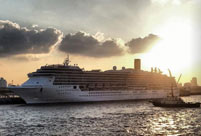Iceland is a name that sounds freezing, for an island close to the Arctic Circle, but in reality the country has a warm and comfortable winter. The Icelanders' passion for poetry and the arts impressed Su Ge, who recently left office as Chinese ambassador to Iceland.
Five years ago, Iceland was the first to feel the chill of global financial crisis. China supported the country’s efforts to stabilize its economy through a significant currency swap deal. Bilateral economic ties rose to a higher level after China and Iceland put pen to a free trade agreement, which also marked the first of its kind between China and a European country.
Distance does not impede the growth of the China-Iceland friendship. The two countries are good friends, even good neighbors, said Su. The following is the full text of the exclusive interview Su Ge gave to People’s Daily Online (PD Online):
PD Online: You worked in Iceland from 2009 to 2013 as Chinese ambassador to Iceland. Could you brief us on the latest progress in China-Iceland ties?
Su: China and Iceland have made rapid and substantial headway in their relationship in many aspects, such as politics, trade and culture.
Economic ties are a good example. Iceland was the most conspicuous victim of the global financial crisis. While Western reporters claimed the island was on the edge of "bankruptcy", China provided positive support to Iceland’s crippled economy.
In 2010, the central banks in China and Iceland signed a bilateral currency swap agreement worth more than 500 million U.S. dollars. Icelandic President Ólafur Ragnar Grímsson commented, "A friend in need is a friend indeed and the people of Iceland will remember this economic and trade cooperation with China during a difficult time. I believe that bilateral cooperation will grow faster and closer."
China and Iceland were coming close to a free trade agreement when I was taking my leave of Iceland. Iceland is the first European country to have signed a free trade agreement with China. In 2012, Wen Jiabao, then Chinese Premier, said during his visit to Iceland that this agreement was historic and would act as a model for others.
After Li Keqiang became Chinese premier, the first government delegation he met was from Iceland. The Premiers of the two countries witnessed the signing of the free trade agreement in Beijing.
PD Online: There is so much positive news on the China-Iceland friendship. As ambassador, you must feel very pleased.
Su: True. China and Iceland are geographically distant. Iceland is small, equal in area to Zhejiang province in southeast China. Iceland's population is around 300,000 while China has 1.3 billion people. But despite these geographic and demographic differences, China and Iceland are good friends, relating to each other on an equal and peaceful basis. The Icelandic President spoke highly of the relationship with China, judging that it was a model for cooperation between large and small countries in international relations in the 21st century.
We are not only good friends, we are good neighbors. The Chinese icebreaker, polar research vessel Xue Long (Snow Dragon), arrived in Iceland in August 2012, when the icebreaker was carrying the fifth Chinese National Arctic Expedition and took the Northern Sea Route through the Arctic for the first time in history. The Northern Sea Route reduced the travel distance from Asia to Europe by one-third compared to the traditional route.
PD Online: What is the significance of the Arctic shipping route?
Su: Iceland is a member of the Arctic Council, and actively supports China's candidacy for observer status with the organization. We appreciate and have expressed gratitude to Iceland for its help. We are not an Arctic country, but we are an observer of the region. Of course, in terms of the overall priorities of China's diplomacy, our current focus remains on our own periphery.
The current sea route to Europe is a long voyage, traveling from Malacca across the entire Atlantic Ocean. If you travel around the North Pole and come directly around from the north, you will save a considerable distance. With global warming and global economic development, the Arctic shipping route might be open in the future, or remain passable for certain months yearly. The significance of the route would then become immense in promoting exchange between Asia and Europe.
PD Online: Although its population is only 300,000, and Iceland suffered badly during the international economic crisis, according to the UN’s recent Human Development Report the country's human develop index ranks 13th worldwide, far ahead of many other countries.
Su: Generally speaking, standards of living in north Europe are among the best in the world. Even when the economy hits a rough patch, Iceland's Human Development Index ranking remains higher than many other countries and regions. You can look it up - in the United Nations Human Development Report for 2007 Iceland ranked first, the world's most livable country.
People may take the name "Iceland" too literally, and think of the country as an ice-covered island. Actually, Iceland’s natural environment is not nearly as harsh as they might imagine. Protected by the warm Gulf Stream current of the Atlantic ocean, the winter temperature in Iceland is relatively mild. An official profile of Iceland indicates that its temperatures are similar to those of New York.
In contrast with its neighboring countries such as Norway, Sweden and Finland, Iceland’s winder is not as severe. Greenland is very cold, and temperatures can reach minus twenty degrees in winter. Iceland tends to remain around zero, with the minimum temperature dropping to minus ten degrees. The Gulf Stream keeps the average temperature at about 3-4 c, which is warmer than Beijing. The summer in Iceland is not so hot as Beijing either.
PD Online: What is Iceland's attitude to Chinese business ?
Su: Economic and trade exchanges between the two countries have been growing steadily. In 2010, China became Iceland’s largest trading partner in Asia. Two-way investment between the two countries, especially Chinese investment in Iceland, is moving in a positive direction. Iceland is helping China to develop skills in geothermal technology, and has introduced technology and equipment to China. Cooperation between the two countries on geothermal technology is promising and positive results are expected. The Reykjavik Music Conference Center, which was built by a Chinese company, is an iconic landmark in the capital of Iceland, and testifies to the friendship and cooperation between the two countries.
In addition, during Chinese premier Wen Jiabao’s official visit to Iceland in 2012, the two sides signed a deal for a project to use cheap electricity in the production of Polycrystalline Silicon. In terms of its long-term prospects, Iceland is a country with rich geothermal resources and advanced geothermal technology, a cheap and clean source of power. Cooperation between Iceland and China therefore holds out great promise.
In particular, the signing of the Sino-Iceland Free Trade Agreement represents an important milestone in the development of bilateral trade. The agreement covers trade in goods, services, investment and many other areas, and promotes comprehensive economic and trade cooperation between the two countries.
PD Online: You lived in Iceland for four years. Can you give us a personal perspective on these four years? What impressed you most?
Su: Iceland is friendly to China. Its people aspire to peace and are deeply immersed in culture. Although the weather is cold, family and friends get together to read poetry, paint, play chess, and make friends through literature. This is a nation with a rich spiritual and cultural life.
I am honored to have been given the opportunity to become Chinese ambassador to Iceland. It was my duty and responsibility as a Chinese diplomatic representative to do my best for the development of bilateral relations between China and Iceland.
 Fire guts 22-storey Nigeria commercial building in Lagos
Fire guts 22-storey Nigeria commercial building in Lagos U.S. Navy Carrier Strike Group stages military exercises
U.S. Navy Carrier Strike Group stages military exercises Volkswagen showcases new energy vehicles in Beijing
Volkswagen showcases new energy vehicles in Beijing  How should we get married nowadays?
How should we get married nowadays?  Commentary:
Commentary: Jakie Chan sees Rubber Duck off in Beijing
Jakie Chan sees Rubber Duck off in Beijing Hello! Horror Halloween Celebration!
Hello! Horror Halloween Celebration!  The catwalk to the world of fashion
The catwalk to the world of fashion  Cruise trip to Taiwan
Cruise trip to Taiwan  Unveil PLA air force base
Unveil PLA air force base  Say goodbye to tube-like apartment building
Say goodbye to tube-like apartment building Oriental education or western education?
Oriental education or western education? China in autumn: Kingdom of red and golden
China in autumn: Kingdom of red and golden National Geographic Traveler Photo Contest
National Geographic Traveler Photo Contest Chinese screen goddesses from Beijing Film Academy
Chinese screen goddesses from Beijing Film Academy Day|Week|Month